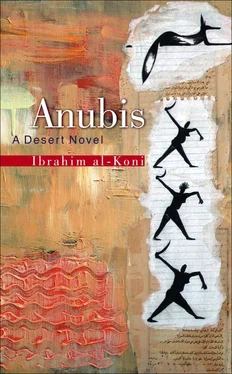What could prevent my lips from smiling once my heart had smiled? What could prevent my heart from smiling when the inner light had smiled?
Yes, this was the secret of the smile that preceded the laugh that so convulsed the consciousness of the encampment that people broke into an uproar that toppled the settlement’s tent posts. Then I wept in alarm at the collapse of the settlement’s dwelling, which was nothing more than a tent, and found that my lady took me into her compassionate embrace, making of her arms a cradle for me. She even crooned to me, rocking me as she hummed, soothing me, and gradually restoring calm to me once more.
The uproar in the tent, however, was greater the second time, when the supreme star rose to wend its way through space, and I found myself emitting, without meaning to, a cry that the people of the spirit world considered a prophecy: “Iyla! Iyla!”
A profound silence reigned; then clamor broke out. The shadowy figure beside my lady asked, “Did you hear that?”
The priestess, without ceasing to rock me, replied, “I heard!”
Silence reigned once more, but the shadowy figure refused to yield to it, “He spoke!”
The tent’s priestess acknowledged this with a coldness that attempted to mask a happiness that could not be concealed, because it was of the same unbearable kind, “He spoke!”
Silence returned to dominate the world, but silence is fated to die at any moment, although it always wagers that a day will come when it achieves eternal victory. Silence died this time too, since the ghostly figure beside the tent post refused to remain silent. “What did he say?”
Encircling my body with her arms, my lady replied, “He spoke the prophecy!”
The apparition squatting beside the tent post remained quiet for a long time before marveling, “The prophecy?”
My compassionate lady rocked me and hugged me to her bosom. I felt such deep warmth I can compare it only to the feeling that overwhelmed me the moment the sky’s heart opened to disclose the sky’s secret and that of her consort the earth. Eventually my lady responded, “He spoke in the Name.”
“The Name? But what name?”
I detected a note of respect in the lady’s tone: “The Name that cannot be preceded or followed by falsehood.”
“But is prophecy of the Name a good or a bad omen?” The lady did not reply.
She did not reply, because she had decided to take on the mission of compassion: she began to teach me the names. She called in my ear as loudly as she could, “Rau … Rau … Rau … Rau …. From today on your name is Wa.” Next she struck her chest with her hand and howled into my ear, “My name is Ma.” Turning toward the ghostly figure squatting beside the post, she shouted his name in my ear: “This fellow is Ba.” Then she took two steps toward the entrance of the tent and carried me outside to bathe me in a flood of the light emanating from the amazing golden disk. Finally she shouted as loudly as she could, “This one is nameless, for he is master of all the names. He is the one you called Iyla. You shall call him Ragh once your speech clears and you regain an ability like mine to make the ‘r’ sound.”
WITH THE ASSISTANCE of my Ma, I began to rehabilitate my tongue, for I had lost control of it during my journey through the unknown. I remembered obscurely that I had once mastered this astonishing organ, even though I did not know how I had lost control of it. Apparently, while I slept I had lost the tongue’s secret along with the secret of my prior existence. I attempted to recall my previous day with heroic courage, but gained nothing for my heroism save a cryptic sign comparable to the prophetic one I had detected in the mien of the sky when it embraced its consort the desert as I awoke to testify to the birth of Iyla from the horizon’s belly. Every time I recklessly attempted to recapture lost time, I experienced insane visions of specters, my body was racked by anxiety, and I succumbed to a splitting headache. I escaped from these dark apparitions by returning to the womb of the desert, for fear of going mad.
An ember that suddenly flared up would occasionally dispel the foyer of shadows and disperse my forgetfulness. Then the desert labyrinth would allow a view of the promise, of the homeland of the promise, and of the true nature of my lost time. I noticed, however, that this inspiration was always short-lived. Since it was a spark destined to go out, the live coal’s flash would last no longer than the blink of an eye. Then regret would sear my heart, leaving me with a bitter taste. I also learned from experience that each of these rare moments of inspiration was unique. I would recall them to delight in the vision. I was forced to enter the desert again to learn part of their secret, and the ravines had to flood with many torrents before I understood that these gleams from firebrands were what the desert’s priests designate as “prophecy.” Prophecy remains a riddle forever, even if we discover an exegesis for it, because prophecy, this awe-inspiring emanation, is not prophecy unless it is a riddle, and a riddle ceases to be a riddle once we find an exegesis for it.
For this reason, I thought I would ignore my previous life experiences, which had cost me the use of my tongue, in order to speak of my new day, which I heard the others call “birth.” (Even my lady, who trilled the word in my ear as a charm, called it “birth.”) I decided to use the community’s language, despite my distaste for it, since I had learned that a creature who finds himself among a group of folks does not have the right to change anything, either by creating new words to replace those in common use or by making mistakes in referring to things. People consider the invention of new names a detestable heresy and an expression of hostility against the customs established over the course of untold generations. For a man’s soul to seduce him into calling things by their true names constitutes another sin. This is considered not only a deplorable display of arrogance but construed as an act of blasphemy against the august law, the lost texts of which so encouraged the privileging of the language of equivocation and concealment that most of its teachings were reduced to collections of bits and pieces, of charms and symbols that defy understanding. Thus the community continued to punish an innovator who invented new names by stoning him to death. They could think of no punishment more severe than this for the presumptuous people whose souls so seduced them into disobeying the teachings of the lost law that they called things by their true names — except exile, since they were certain that exile is an even more excruciating punishment than death. There is nothing more miserable than to be born a man only to find yourself alone and isolated in the eternal desert, unable to use the sole organ that marks you as a man rather than a rock, a tree, a lizard, or a creature spawned by the jinn; although many assert that the people of the ultimate community will excel in their use of the tongue.
I confess that this exaltation of the tongue upset me and awakened old pains associated with my inexplicable loss of control over mine. To understand what had really happened, I several times committed the error of questioning the spirit world, which may be slow to act, but whose forbearance does not last forever. Instead of solving my riddle, it requited my stubbornness with an ailment called anxiety.
The first symptom of this malady was a juvenile melancholy that overwhelmed me the moment I found myself wrapped with swaddling clothes and safeguarded by the knife blades my Ma used to protect me from the enmity of evil jinn. Next came a period when my melancholy degenerated into bitter outbursts of weeping. Anxiety intensified once it was time for me to be freed from the cradle’s shackles. I abandoned myself to the seductions of the eternal desert and found myself isolated and forsaken, without power or might. So I walked in my desert alone, played in my desert alone, cared for my flocks in my desert alone, learned to comfort myself by hunting lizards alone, and sang haunting laments alone, until solitude became a companion for me, as well as a father, mother, and lord. The longer I cohabited with solitude, the deeper, richer, and more mysterious became my attachment to it. The deeper, richer, and more mysterious this attachment grew, the deeper, richer, and more mysterious became my sense of anxiety. Finally I realized that anxiety is a true lord that must inevitably take precedence over all others, since it is anxiety that leads people to lords. I ascertained as well that anyone free of anxiety is unable to take a lord in our world.
Читать дальше












